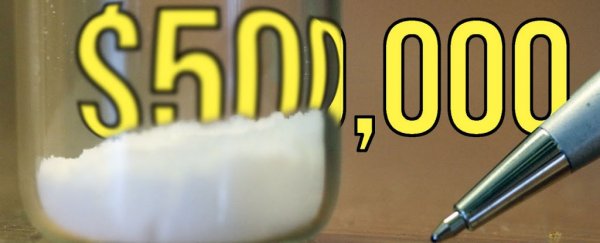If you're looking for a really dumb thing to spend your money on, look no further than calcium-48, an extremely rare isotope of calcium that carries such an astronomical pricetag, they won't even let world-renowned chemist Sir Martyn Poliakoff touch it.
This substance is so scarce, it makes up just 0.187 percent of naturally occurring calcium on Earth, and in order to be isolated from other forms of calcium, it has to be separated, atom by atom, in a massive magnetic separating machine.
In the video below, Sir Martyn gives us a look at half a million dollars' worth of calcium-48, and admits with quivering hands that he's not even allowed to touch the jar:

He explains that the reason this substance is so ridiculously expensive is because you first have to produce calcium ions by heating your calcium sample to a very high temperature, and then separate the isotope out in a high vacuum, under a magnetic field.
The process is so involved, and requires such specialised and expensive equipment, that only one place in the world makes calcium-48: a Russian facility in the town of Lesnoy, about 250 km from the city of Yekaterinburg.
The global production of the stuff is just 10 grams a year - about 2 teaspoons.
"So, there's a monopoly supplier, but if you want to make money, making calcium-48 is probably not the market you should go in for, because there's so few customers," says Sir Martyn in the video above.
The reason anyone bothers at all with calcium-48 is for nuclear physics - we need it to synthesise superheavy elements, which are entirely synthetic elements that have incredibly short half-lives, ranging from a few minutes to a few milliseconds.
So basically, we use an incredibly elusive isotope to study incredibly elusive elements.
But why calcium-48 in particular? Why not one of the other isotopes of calcium that are way cheaper to produce?
I'll let Sir Martyn explain that in the Periodic Video episode above, but let's just say, calcium-48 is might be total pain, but it's got neutrons like no one's business.
H/T Digg
